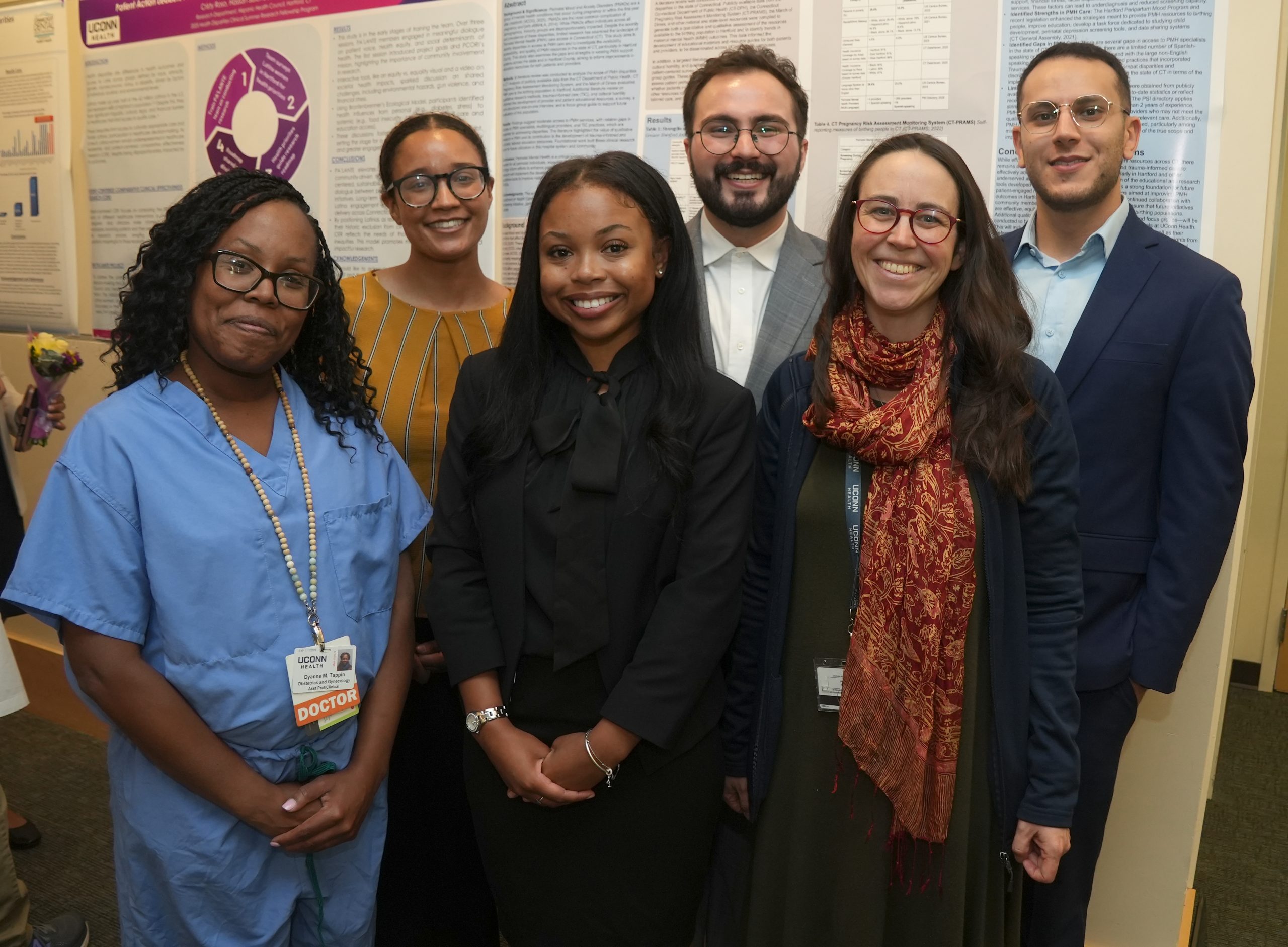Growing Palliative Care Team Expands Access into Ambulatory Setting
Palliative care is a medical subspecialty focused on providing relief from the symptoms and stress of serious illness. The goal is to improve the quality of life for both the patient and the family. Palliative care is appropriate at any age and stage of illness and can be provided along with all other medical treatments.
Eight years ago, UConn Health began outpatient palliative care at the Carole and Ray Neag Comprehensive Cancer Center with a cancer center supportive care clinic. The supportive care clinic includes two full-time nurse practitioners and support from an interdisciplinary team. The service has continued to grow since it was started with volumes increasing 250%. As the Cancer Center grows, volume and need for palliative care is also anticipated to increase.
When the need for inpatient hospital palliative care became evident during the COVID-19 pandemic, Sarah Loschiavo, DNP, APRN, FNP-BC, ACHPN, nursing director of Palliative Medicine, Supportive Care and Hospice Services knew another subset of patients could benefit. The inpatient palliative care team was formed to fit the unique needs of the institution.
November 6 marked a year for the inpatient palliative care program at UConn John Dempsey Hospital, and to date, the service has completed over 500 patient consults.
“This was a great start to a brand-new service,” says Loschiavo. “It’s a testament to the specialty palliative care providers that are part of the team and the collaboration with the hospitalist & specialty care teams which impacts the care of their patients. They are seeing the benefit from the patient and family side, as well as quality care and improved clinical outcomes so they are referring again.”
Joining and growing UConn Health’s palliative team is Dr. Mary Buss, a practicing palliative care physician and trained oncologist, who began at UConn Health just a month ago as the director of Palliative Care Services. Staffed by Buss and geriatrician, Dr. Germaine Soliman, an Outpatient Palliative Care Clinic launched on November 13. Her scholarly work focuses on improving the integration of palliative care into the care of patients with cancer and other serious illnesses. She is developing different models for delivering palliative care and studying their impact on patient outcomes.
Her goal is to ensure that all patients who can benefit have access to palliative care in all areas of the clinical enterprise. She also sees opportunities to do better when transitioning patients to hospice, which is part of her role as hospital medical director with the Visiting Nurse and Hospice of Litchfield County. She is eager to build a relationship to ease a very emotional and difficult time for patients and their families.
“Palliative care by nature is interdisciplinary so we intend to bring together a team that works together and functions well, recognizing the important role different disciplines, including social work, spiritual care and pharmacy, in addition to medicine and nursing, in improving the quality of life for our patients and their families,” says Buss.
“Palliative care is delivered alongside disease-focused care and enhances the patient’s current care by focusing on the quality of life for them and their family,” says Buss.
Because patients seen in the cancer center have access to the supportive care team, Buss expects the outpatient clinic to primarily see patients with illnesses other than cancer, such as cardiac, pulmonary, and nephrology issues. The clinic will take referrals for any ambulatory patient who needs palliative care services.
In addition to expanding clinical access to palliative care, Buss’ goal is to enhance palliative care education across the system. One concrete way of doing that is building a hospice and palliative medicine fellowship program, which is the official name of the medical subspecialty. Buss plans to start a fellowship program which she has successfully created at two other institutions, but first, she wants to ensure that we have sufficient clinical exposure to provide a good training experience in all the relevant settings – clinic, the hospital, and at home with hospice.
Buss’s favorite story about how to explain palliative care came from a patient with lung disease. When she introduced herself to the patient “I’m from the palliative care team,” the patient responded, “Oh I’ve met you before, you guys are the feel-good team. You’re here to help me feel good.” Buss thinks this is the best description of palliative care – a team focused on helping patients live and feel better
The palliative care outpatient clinic at UConn Health is a referral-based clinic. Referrals can be placed in EPIC.
Latest UConn Today
- Incoming UConn Medical Students Get Hands-On Summer Research ExperienceFor the first time the Health Career Opportunities Program of UConn Health offered matriculating UConn medical students summer research opportunities.
- Partnering with Communities to Improve HealthInCHIP’s Community Engagement Research Core’s latest networking event offers insights for successful community research partnerships
- Study Highlights Higher Rates, Risk Factors for Non-Fatal OverdosesA new opioid overdose study has identified several key risk factors associated with non-fatal overdoses drawing from a sample of people who use opioids in New Haven
- Archiving for Justice, Truth, and Memory: Unpacking the Baggage of What Went BeforeReflections on the importance of the newest addition to UConn’s ICTY Digital Archives, the Srebrenica Genocide Archives Collection.
- Multiple Sclerosis Patient Sees Bright FutureFrom unheard to understood
- UConn AUKUS Scholars Explore Undersea Vehicle Technology, International Collaborations in AustraliaFive College of Engineering students studied systems thinking and interdisciplinary teamwork essential in modern undersea vehicle development













